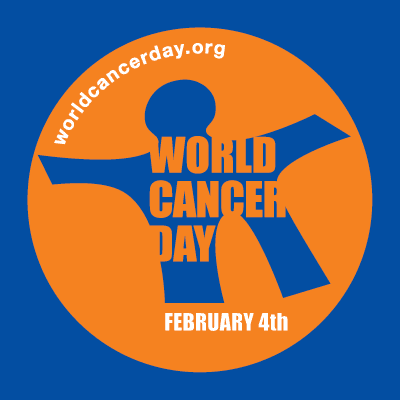03 Feb, 2017
Author/blogger Reggie Simpson
We can, I can. Unity.
World Cancer Day takes place every year on 4 February and unites the world’s population in the fight against cancer. This year, and through 2018, With a theme of ‘We can, I can’, World Cancer Day aims to save millions of preventable deaths each year by raising awareness and education about the disease and pressing governments and individuals across the world to take action.
Currently, more than 8 million people worldwide die from cancer every year, out of which, more than 4 million people die prematurely (aged 30 to 69 years).
World Cancer Day was established by the Paris Charter , which was adopted at the World Summit Against Cancer for the New Millennium in Paris on 4 February 2000.
Around the world, communities will hold festivals, walks, seminars, public information campaigns and other events to raise awareness and educate people on how to fight cancer through
, through
healthy eating and physical activity
, by
, and by
urging public officials to make cancer issues a priority
.
One of the most visible events marking the occasion in the United States will be in New York, where the Empire State Building will be lit blue and orange for the seventh year in a row. The colours are those of the Union for International Cancer Control (
.
), which organises World Cancer Day.
UK Unity
Not to be ‘outshone’, 10 UK charities are uniting in support of World Cancer Day. They are all encouraging supporters to purchase and wear a Unity Band® on 4th February to show their support and to raise funds. The money will be used to fund research projects and support the work of scientists, doctors and nurses across the UK.
Each charity has its own Unity Band®, available in a range of ways including online, from charity shops and from some stores for a suggested donation of £2. The bands are each made from two differently coloured parts knotted together, to represent strength in unity and the power of what can be achieved when people join forces.
See: https://fundraising.co.uk/2017/01/25/10-cancer-charities-unite-2017-world-cancer-day/#.WJShlyOLRaE
There is particular relevancy to World Cancer Day with the UK press today reporting a significant rise in cancer rates, particularly among women:
http://www.itv.com/news/2017-02-03/cancer-in-women-rising-six-times-faster-than-in-men/
Podiatry and Cancer
There are many kinds of cancers of the foot; some take the form of cysts and lesions, while others are more widespread:
- Malignant melanoma is a skin cancer that is very curable if caught early. Although it makes up only one percent of skin cancers, malignant melanoma accounts for over 60 percent of skin cancer deaths. It is estimated that approximately 30 percent of melanomas occur in the lower extremities, and that three percent occur in the feet.
- Tumours of tissue, bone under the toenail) can be benign or malignant. Sometimes they can deform the nail and cause deformity and need to be removed surgically, although they can reoccur.
- Plantar fibroma in the plantar fascia, bottom surface of the foot
- Benign non-cancerous tumours of the tendon sheath. These masses are generally found on the toes, top of the foot or sides of the foot. They can also occur deep inside the foot. They are firm irregular masses that are commonly painful.
Podiatry and Cancer Patients
Some of the most common complications resulting from cancer treatments such as chemotherapy include:- Chemotherapy-induced peripheral neuropathy (damage to nerves in the extremities
-
Hand-foot syndrome (resulting from cytotoxic agents
-
Hand-foot skin reaction (resulting from targeted therapies)
-
Paronychia (soft tissue infection around the nail often leading to a fungal infection)
-
Fibroma (benign tumours in connective tissue)
-
Onycholysis (separation of nail from the nail bed)
-
Oedema, (swelling in the body’s tissues)
In 2012, the Netherlands developed an educational programme for podiatrists. The main goal of the programme was to encourage awareness of potential complications and screening, providing appropriate guidance to patients and keeping the feet of cancer patients in optimal condition during and after treatment.
Closer to home, the Buckingham Branch of the Society of Chiropodists and Podiatrists (SCP) is planning a Cancer Study Day on the 1st April 2017. Branch members are increasingly seeing patients who are having treatment for cancer. It is hoped that Dr Bilal Patel & MacMillan Care will be the featured speakers, focusing on clinical treatments as well as emotional support: Talking about Cancer, Understanding the Long Term Impact, How to Support Carers.






